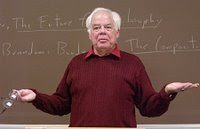
Metapolítica
articles
conversation with my friend the philosopher Victor Samuel Rivera ( http://www.victorsamuelrivera.blogspot.com/ ) exchanged views on fashion around this left-liberal scholars to adhere fervently to the call pragmatism, with the American professor (now deceased) Richard Rorty his new Guru and mentor. Gone
then Kant, Rawls and Habermas and they all give up now before this philosophical Anglo-Saxon root that seems to offer an attractive and simple argument to all the beliefs they advocate so vehemently as the obvious case of human rights, deliberative democracy, tolerance, transitional justice, civil society etc., etc. , etc.
But, before to refer to what I was saying to Victor Samuel, would need to know some basic scope of this new kind of pragmatism developed by Rorty on the basis of the classical theorists of the nineteenth century American power as Dewey, and James Pearce.
As is known, pragmatism is characterized by its rejection of any absolute truth and that the conceptual world (formal) the intellectual (rationalism) were unable to reflect reality.
Thus, one might say that "Pragmatism is an American movement in philosophy founded by CS Peirce and William James and characterized by the doctrines that the meaning of concepts must be found in its practical implications for the function of thought is to guide action and that the truth should consider pre-eminently by the practical consequences of belief "
Thus, as stated was no truth to them at the convergence of reality and thought but the utility they represented to the subject, not necessarily be useful as what providing pleasure or comfort to the subject but that serves to organize the world a practical way of thinking.
Richard Rorty, then picks up many of the theses of classical pragmatism to conclude with a completely anti-metaphysical and anti-foundational discourse as expected, in particular highlighting the contingency of language that was built just across the universe of modern philosophy then demonstrating the relativity of concepts such as rationalism and irrationalism or truth and falsehood, for example, they had behind them a living obviously be essential. However, Rorty would take care not to be accused of relativism (as also would be the case Isaiah Berlin, for example) while, it remained possible that the presence of consensus.
Undoubtedly, the best-known book Rorty has been Contingency, Irony and Solidarity, [1] text in which the American professor says it looks like to propose a liberal utopia in which one can speak of irony ( would mean the fund is not taken seriously any beliefs including ours) and at the same time also of solidarity in the sense that one must recognize other human beings as "one of us", thanks to our imagination.
as follows:
"The subject of Rorty the ironist, the citizens of their society Liberals are people who perceive the contingency of their language of moral deliberation, consciousness and community. The paradigmatic figure is the liberal ironist who think that cruelty is the worst thing you can do and who combines a commitment to understanding the contingency of their own commitment and here is the irony. "
turn, in a famous interview, Rorty needed on what was meant by the liberal utopia "is simply the idea, not new, of equal opportunities. More or less what Rawls describes in his book, a theory of justice, the idea of \u200b\u200ba society in which inequality and although there are reasons for it, would still many more otherwise " [2] .
Finally, for the achievement of his liberal utopia, Rorty bet on the development of a narrative against a theory, ie, a historicist and nominalist culture to communicate the present with the past on the one hand, and partly with utopias future, considering the continued manifestation of utopias as a clear presence of freedom. In short, freedom replaced the truth, and this was the main characteristic of liberal society.
But the tenor of the conversation to Victor Samuel Rivera was not exactly on the side of affirming the paradoxically conservative rortiano pragmatism and neo-pragmatism, they are clearly what we see today is rather the affirmation of a set of liberal values \u200b\u200b(individualism, human rights, etc..) obviously would have a degree of permanence in time - at least for liberals - and that without questions contain the essence of what we now call political correctness. But if we follow the discourse of contingency, we would expect that in future such values \u200b\u200bcan be moved, in fact, in the past we could find many ways not just liberal pragmatism, ie of various ideological tint [3] Edmund Burke in the eighteenth century (if the great enemy of the French Revolution that is claimed to date by the liberal left) was a pragmatist, Benito Mussolini in the twentieth century (this is commented Victor Samuel) was also another representative of pragmatism since then and in that context the rules stated fascism were the rules of common sense.
curious affinity between Burke then with Mussolini and the latter with Rorty!. Sure there may say that Mussolini could not be a liberal pragmatist because as the teacher pointed out - too late - Judith Shklar, a liberal would be one which would consider the worst act that could make would be an act of cruelty, and Mussolini would probably be seen - by the Communists and the Liberals - as a cruel man is, someone not supportive (although it could have been supportive of his countrymen love that he originally came from the quarries of socialism.)
Anyway, I think that there are still a lot to say about this problem of contingency, irony and solidarity, especially how it could continue to support this "utopia" that preaches freedom, but can not find the way to give real meaning to it, just what if you could make a metaphysical discourse which would be also essential for her to finally be valued and not become just a word used in political struggle.
[1] Richard Rorty, Contingency, Irony and Solidarity, Cambridge, Polity Press, 1996
[2] Richard Rorty, Protecting freedom, Madrid, Trotta, 2005
[3] Clearly, Rorty and the company Liberalism is not an ideology
then Kant, Rawls and Habermas and they all give up now before this philosophical Anglo-Saxon root that seems to offer an attractive and simple argument to all the beliefs they advocate so vehemently as the obvious case of human rights, deliberative democracy, tolerance, transitional justice, civil society etc., etc. , etc.
But, before to refer to what I was saying to Victor Samuel, would need to know some basic scope of this new kind of pragmatism developed by Rorty on the basis of the classical theorists of the nineteenth century American power as Dewey, and James Pearce.
As is known, pragmatism is characterized by its rejection of any absolute truth and that the conceptual world (formal) the intellectual (rationalism) were unable to reflect reality.
Thus, one might say that "Pragmatism is an American movement in philosophy founded by CS Peirce and William James and characterized by the doctrines that the meaning of concepts must be found in its practical implications for the function of thought is to guide action and that the truth should consider pre-eminently by the practical consequences of belief "
Thus, as stated was no truth to them at the convergence of reality and thought but the utility they represented to the subject, not necessarily be useful as what providing pleasure or comfort to the subject but that serves to organize the world a practical way of thinking.
Richard Rorty, then picks up many of the theses of classical pragmatism to conclude with a completely anti-metaphysical and anti-foundational discourse as expected, in particular highlighting the contingency of language that was built just across the universe of modern philosophy then demonstrating the relativity of concepts such as rationalism and irrationalism or truth and falsehood, for example, they had behind them a living obviously be essential. However, Rorty would take care not to be accused of relativism (as also would be the case Isaiah Berlin, for example) while, it remained possible that the presence of consensus.
Undoubtedly, the best-known book Rorty has been Contingency, Irony and Solidarity, [1] text in which the American professor says it looks like to propose a liberal utopia in which one can speak of irony ( would mean the fund is not taken seriously any beliefs including ours) and at the same time also of solidarity in the sense that one must recognize other human beings as "one of us", thanks to our imagination.
as follows:
"The subject of Rorty the ironist, the citizens of their society Liberals are people who perceive the contingency of their language of moral deliberation, consciousness and community. The paradigmatic figure is the liberal ironist who think that cruelty is the worst thing you can do and who combines a commitment to understanding the contingency of their own commitment and here is the irony. "
turn, in a famous interview, Rorty needed on what was meant by the liberal utopia "is simply the idea, not new, of equal opportunities. More or less what Rawls describes in his book, a theory of justice, the idea of \u200b\u200ba society in which inequality and although there are reasons for it, would still many more otherwise " [2] .
Finally, for the achievement of his liberal utopia, Rorty bet on the development of a narrative against a theory, ie, a historicist and nominalist culture to communicate the present with the past on the one hand, and partly with utopias future, considering the continued manifestation of utopias as a clear presence of freedom. In short, freedom replaced the truth, and this was the main characteristic of liberal society.
But the tenor of the conversation to Victor Samuel Rivera was not exactly on the side of affirming the paradoxically conservative rortiano pragmatism and neo-pragmatism, they are clearly what we see today is rather the affirmation of a set of liberal values \u200b\u200b(individualism, human rights, etc..) obviously would have a degree of permanence in time - at least for liberals - and that without questions contain the essence of what we now call political correctness. But if we follow the discourse of contingency, we would expect that in future such values \u200b\u200bcan be moved, in fact, in the past we could find many ways not just liberal pragmatism, ie of various ideological tint [3] Edmund Burke in the eighteenth century (if the great enemy of the French Revolution that is claimed to date by the liberal left) was a pragmatist, Benito Mussolini in the twentieth century (this is commented Victor Samuel) was also another representative of pragmatism since then and in that context the rules stated fascism were the rules of common sense.
curious affinity between Burke then with Mussolini and the latter with Rorty!. Sure there may say that Mussolini could not be a liberal pragmatist because as the teacher pointed out - too late - Judith Shklar, a liberal would be one which would consider the worst act that could make would be an act of cruelty, and Mussolini would probably be seen - by the Communists and the Liberals - as a cruel man is, someone not supportive (although it could have been supportive of his countrymen love that he originally came from the quarries of socialism.)
Anyway, I think that there are still a lot to say about this problem of contingency, irony and solidarity, especially how it could continue to support this "utopia" that preaches freedom, but can not find the way to give real meaning to it, just what if you could make a metaphysical discourse which would be also essential for her to finally be valued and not become just a word used in political struggle.
[1] Richard Rorty, Contingency, Irony and Solidarity, Cambridge, Polity Press, 1996
[2] Richard Rorty, Protecting freedom, Madrid, Trotta, 2005
[3] Clearly, Rorty and the company Liberalism is not an ideology
